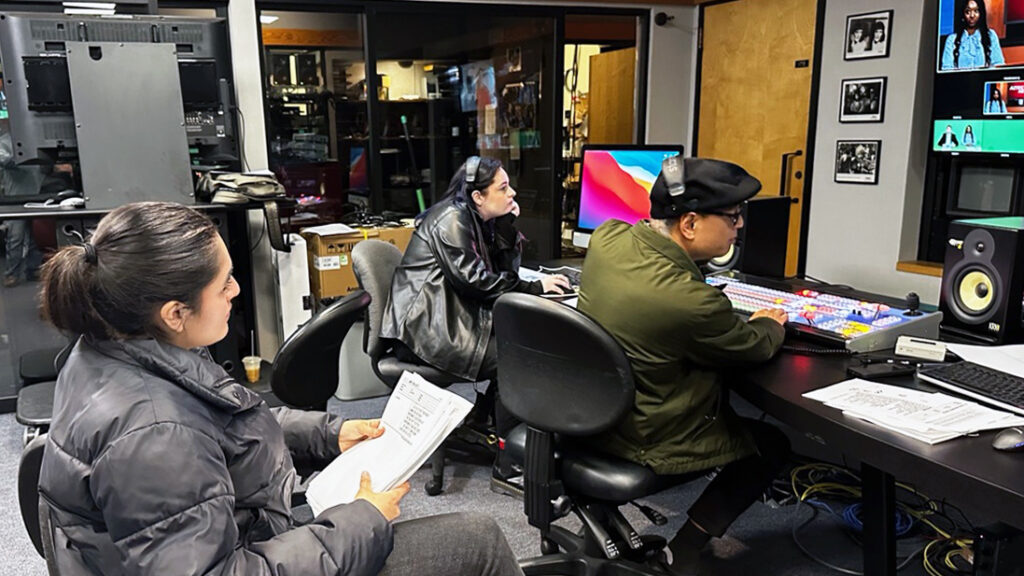
Jazlyn Dieguez in the newsroom at San Diego State University, where she spent some of her non-studying college time.
Credit: Jazlyn Dieguez / EdSource
I am a workaholic, and naturally, I made this realization at 4 on a Sunday morning.
I had been working on a 15-page research paper on artificial intelligence in hopes of making more progress before the approaching deadline. But instead of working in study-friendly silence, I was engulfed by the sound of Pitbull’s “Time of Our Lives” blaring from my neighbor’s backyard.
Amid the sound of friends laughing and singing together, I paused to reflect on how I felt.
My eyes were groggy and sore, my mouth was dry, and my body had fused to the living room couch. Not only did I feel physically sick, I also had a lingering sense of stress and anxiety that inhibited me from taking a break from my classwork.
This lingering feeling robbed my life of joy. It pressured me to say “no” to spending time with friends and loved ones out of fear of falling behind in school and extracurriculars.
And I know I am not alone in these sentiments.
According to a Gallup survey of more than 2,400 college students at four-year U.S. institutions, 66% reported experiencing stress and 51% reported feeling worried in the spring 2023 semester.
It’s difficult to witness many of my peers struggle to cope with these emotions. I have also experienced this struggle by pouring too much of my time and energy into school-related activities: joining new clubs, taking on editorial roles, starting ambitious group projects, and more.
While achieving these milestones brought temporary satisfaction, the pressure to overachieve intensified my anxiety, ultimately leading to mental exhaustion throughout the year. It was a clear case of burnout, a state of feeling fatigued and overwhelmed by ongoing pressure at work.
In a study examining psychological distress and burnout among first-year college students, reports found that 27% of students who reported psychological distress in their first semester were at increased risk of depression, depersonalization and higher levels of burnout.
As a first-generation college student, there’s something I wish I knew before starting college: how to find a work-life balance. It’s taken my whole college experience to realize that I am at fault for applying so much pressure on myself to achieve more. But, recognizing this was the first step toward making a positive change.
Here are some strategies that have helped me improve my work-life balance as a student:
- Reduce screen time: Use specific app features to control and monitor screen usage. This approach can help enhance work productivity and physical well-being by reducing eye strain and improving sleep quality. Additionally, scheduling designated times for phone use can minimize aimless time spent online.
- Embrace social opportunities: Say “yes” to quality time with friends, or communicate your interest in spending time with others. Swapping study sessions for casual dinners, coffee dates or game nights nurtures emotional and physical well-being through meaningful social interactions. This approach motivated me to attend my first San Diego State University basketball game — although not until my senior year — and enjoy more concerts in San Diego.
- Set clear goals: Identify three to five realistic daily goals using a to-do list application or a notepad to track progress. Setting short-term goals can provide focus and motivation, further guiding individuals toward achieving personal and academic milestones.
As I began to wrap up my time at San Diego State, I wanted to make the most of my college experience before I walked across the graduation stage. I refused to be consumed by the stress and anxiety of pending coursework; I wanted to remember college for the memories shared with people I care about, not the late-night study sessions spent alone.
Implementing these methods helped me remove the pressure I place on myself and gain a stronger sense of control over my responsibilities. Knowing that I can progress toward my goal through these small adjustments brings me relief.
I’m most proud of myself for making this change, as I have been able to experience more in the last few months than in previous years.
Incoming students embarking on their college careers need significant support to navigate through intensified stressors. But it’s important to remember that a life beyond academics is a life set up for success. It is possible to have the best of both worlds.
•••
Jazlyn Dieguez is a member of EdSource’s California Student Journalism Corps. She graduated in May with a journalism degree from San Diego State.
The opinions expressed in this commentary represent those of the author. EdSource welcomes commentaries representing diverse points of view. If you would like to submit a commentary, please review our guidelines and contact us.

دیدگاهتان را بنویسید